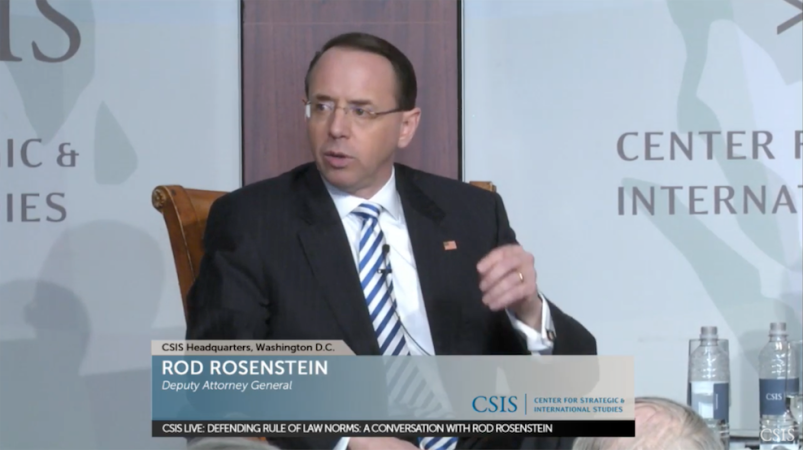Deputy Attorney General Rod Rosenstein on Monday provided a small window into special counsel Robert Mueller’s investigation, and how newly confirmed Attorney General William Barr might handle Mueller’s report on the probe.
The choice of what to do with the information Mueller presents, Rosenstein said during an event at the Center for Strategic & International Studies, will “be a decision the attorney general makes.”
“But,” Rosenstein continued, “I can tell you that I think the [special counsel] regulation was appropriately written to ensure that we can be confident that the investigation was conducted in an independent way, and that if that special prosecutor believed something should be done and we prohibited him from doing it, there would be a report about that to Congress at the end.”
As to what Barr will do, Rosenstein said, “You’d have to ask him that question.” He added later: “I think Attorney General Barr is going to make the right decision.”
Earlier in Rosenstein’s remarks, which occurred during a Q&A following a speech at CSIS, the deputy attorney general said that while “there’s a lot of confusion” about the relationship between special counsel Mueller and the Justice Department, “there’s no confusion by Bob Mueller or me or the people who are working with us, about the accountability of the special counsel, and the responsibilities are set forth in the regulation. We’re going to comply with those rules.”
As some reporting indicates that Mueller may be close to wrapping up his probe, there remains an open question about what Barr will do with the special counsel’s final report.
“I’m very confident that when we look back in the long run on this era of the Department of Justice, we’ll be proud of the way the department’s conducted itself, and the President will deserve credit for the folks that he appointed to run the department,” Rosenstein said at one point Monday, specifically naming Barr, the deputy attorney general nominee Jeffrey Rosen, and FBI Director Christopher Wray.
Without naming the Mueller probe specifically, Rosenstein made the case for not releasing information about Americans who are not charged with a crime.
“There’s a knee-jerk reaction to suggest that we should be transparent about what we do in government, but there are a lot of reasons not to be transparent about what we do in government,” he said, later adding that while “there may be legitimate reasons for making exceptions,” the DOJ had a responsibility to demonstrate “appropriate sensitivity to the rights of uncharged people.”
“If we aren’t prepared to prove our case beyond a reasonable doubt in court, then we have no business making allegations against American citizens,” Rosenstein said, recalling advice he used to give subordinates. “I know there’s a tension there.”
“My own view about it is that we’re better off following the rules and ensuring that our employees respect their obligations to conduct their investigations in confidence.”







Rosenstein implies that those not charged with a crime should not have their name released in any final Mueller report. However, it’s quite possible — and even likely — that Trump will be an unindicted co-conspirator wlth other defendants but not himself charged with crimes under DOJ rules since he is “president”. Under this circumstance, Trump’s name needs to be released to allow for impeachment proceedings to occur.
A real brave answer! Doesn’t mean s#!t. More pandering to his boss.
One gets the impression he really really didn’t like Comey’s grandstanding in 2016.
You raise an important point. I assume that Rosenstein was referring to the DOJ internal rule about not naming uncharged individuals within the context of prosecutorial actions against others. I also assume that this rule is not applicable to Special Councel final reports…but perhaps I’m being naive.
If it is redacted, then everyone, Republican or Democrat, will presume that it’s hiding evidence of Individual-1’s guilt.
So it’s really to everyone’s interests that the full report comes out. And I think, insofar as Individual-1 is concerned, they’ll make every effort to do so.
Yeah, especially because that and the aftermath of that (requests from Congress for DOJ materials on the case, which they did provide) created a precedent of providing a shitload of material about an uncharged person…